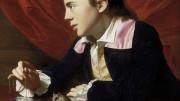The work was commissioned by Serge Koussevitsky and the trustees of the Boston Symphony Orchestra in the spring of 1940 for the opening exercises of the new Berkshire Music Center at Tanglewood. The head of the center's choral department was Thompson's future Harvard colleague G. Wallace Woodworth '24. Koussevitsky wanted "Woody" to lead the entire student body in the new anthem to symbolize the center's mission: the performance of music.
The date for the opening was July 8. Thompson had been preoccupied with another commission, but from July 1 to July 5 he was able to turn to Koussevitsky's request. Woody had his large chorus ready to rehearse, but opening day approached and no music arrived. On July 8, with 45 minutes to go, it appeared. Woody got his first look at the score and reassured his charges, "Well, text at least is one thing we won't have to worry about." The performance successfully launched a tradition: to this day Alleluia is performed each summer at the center's opening.
The anthem's tempo mark of lento was very important to the composer. France had just fallen to the Nazis, and Thompson later explained, "The music in my particular Alleluia cannot be made to sound joyous...here it is comparable to the Book of Job, where it is written, 'The Lord gave and the Lord has taken away. Blessed be the name of the Lord.'"
Thompson's other works include three symphonies, two string quartets, and a scattering of instrumental pieces. But his writing for voice spans his whole life, from The Five Odes of Horace, written in 1924, to Twelve Canticles, written a year before his death. The Harvard undergraduate who, in trying out for the Glee Club, was unaccountably turned down by Archibald T. "Doc" Davison concluded: "My life has been an attempt to strike back." And indeed he did. His compositional output is striking in two ways. First, it is predominantly choral and unfailingly accessible to amateur choruses; second, for that very reason, most of his works--whether religious, commemorative, or celebratory--were composed, enviably, in response to commissions.
In 1935, for example, the League of Composers, of which he had become an officer, commissioned him to write a work for a particular college chorus: the combined Harvard Glee Club and Radcliffe Choral Society. That summer the Worcester Art Museum acquired a version of The Peaceable Kingdom by the American primitive painter Edward Hicks. Thompson went to view the painting and became aglow not only with what he saw but also with the biblical passage portrayed (Isaiah, 11:6-9), which ends: "For the earth shall be full of the knowledge of the Lord, as the waters cover the sea." Like Hicks, Thompson was drawn to the theme that the wicked will be destroyed and the good will go to heaven.
The composer next read all 60 chapters of Isaiah and copied out passages that appealed especially. The care with which he met the challenge to arrive at a choral sequence based on the unfolding of a dramatic narrative is reminiscent of how Brahms prepared verses for his German Requiem. Thompson's dream of composing a cycle based on sacred texts was realized for the first time, and he would benefit from the experience in composing many large works to come: Mass of the Holy Spirit, Requiem, and settings based on Saint Luke: The Nativity and The Passion. This kind of creative challenge was for Thompson the most stimulating for the exercise of his craft.
Thompson's love of music was matched by his love of teaching the art to students. He began in 1927, at Wellesley College, teaching harmony and counterpoint and leading the choir. In 1935 he published College Music, which had a major impact on music courses for undergraduates. (In the same year, he served on the Harvard visiting committee that recommended the creation of what would become Music 1, "The History of Music," which aimed to instill an ability to listen discriminately and to provide a comprehensive sweep from Gregorian chant to the present.) Thompson would teach at Berkeley, the Curtis Institute of Music, the University of Virginia, and Princeton before returning to Harvard in 1948, where he chaired the music department from 1952 to 1957, and became the first Walter Bigelow Rosen professor of music.
A man of great wit and a bon vivant whose charm was infectious, Thompson was also a self-assured artist. His one-time junior colleague, James Haar, has written: "Randall Thompson's choral works are a shining reflection of the joy and creative skill with which he taught musical craft--of Palestrina and Lasso, of Monteverdi and Schütz, of Bach and Handel. It has been his belief that music of this craft is timeless in its nature, and can form part of the basis of a composer's working vocabulary without loss to his individual talent. In this he is a true classicist and an academic in the best sense."
Elliot Forbes '40, A.M. '47, is Peabody professor of music emeritus and the former conductor of the Harvard Glee Club and Radcliffe Choral Society.





